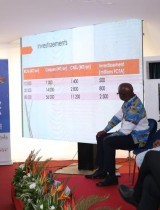

Increase export revenues of 9 cashew processors in Côte d'Ivoire and Benin
On October 2, while the Agriculture and Animal Resources Show was in full swing in Abidjan, representatives of processors and support structures gathered to discuss the state of play and especially the prospects for the valorization of the cashew shell in Côte d'Ivoire.

This panel was organized as part of the CBI Cashew Nut Program, which aims to increase cashew revenue export of 9 cashew nut processors to Côte d'Ivoire and Benin, while contributing to the structuring of the sector and the strengthening of skills in export marketing, CSR and valorization of the CNSL.

Nitidæ in collaboration with the design office Fúnteni were responsible for presenting the results of the feasibility study of CNSL sales, carried out since 2020 with the support of the CBI. In Côte d'Ivoire, the shells are already sold by processors and represent revenues of 6-8% of the cost price of the nuts. But these benefits could be maximized if local value chains are set up, making it possible to add value to the shell through the use of its by-products, particularly in the local economy. The ambition of the consortium was to demonstrate that in Côte d'Ivoire the context is conducive to the establishment of a circular economy around the cashew shell.

Through this, an inventory of current cashew nut and shell processing capacities was carried out. Opportunities in the domestic and export markets for this promising product, and for its residue called shell cake, have been limited. The value that can be derived from the shell is essentially dependent on the sale price of the CNSL, which in turn depends on oil prices. The Dorado Ivory representative recalled the multiple uses of CNSL and its similar characteristics to the phenolic fraction of petroleum. Furthermore, CNSL is increasingly sought after as a raw material for use in biofuel, as recalled in the article recently published in Perspectives in cashew. Thus, one approach has been to explore local markets where fuel price fluctuations are less, and where it has been demonstrated that a demand exists to replace fossil fuels in industrial burners. The feasibility of replacing current fuels with CNSL had also been demonstrated by convincing experiments in our biofuels platform.
The full valorization of the shell by electricity production and biochar production in parallel was also presented. This path, which has also become a reality through a Nitidæ project (Agrogazélec), is also compatible with the prior extraction of CNSL and makes it possible to derive maximum benefits through the in situ valorization of this biomass. Finally, the Cashew Cotton Council presented its Shell Valorization Center initiative which should soon see the light of day in Yamoussoukro. Thus, the CCA is taking the lead in accelerating developments towards a complete and fully beneficial valorization of the shells and other cashew by-products.

From left to right, the panelists Mr Karim Berthé (CCA), Mr Simon Villard (Fúnteni), Vivek (Dorado Cashew), Ms Julia Artigas Sancho (Nitidæ), Mr Adama Coulibaly (CCA), Yannkick Kongoue (APROTIC), Marcel Ouattara (GIC-CI)
The full presentation of the panel can be downloaded from the project section (Cardoil). We sincerely thank the various speakers: the CBI, Dorado Ivory, the GIC- CI, the APROTIC and the Anacarde Cotton Council. Nitidæ remains, as since its beginnings, actively engaged in the cashew sector in Africa.

